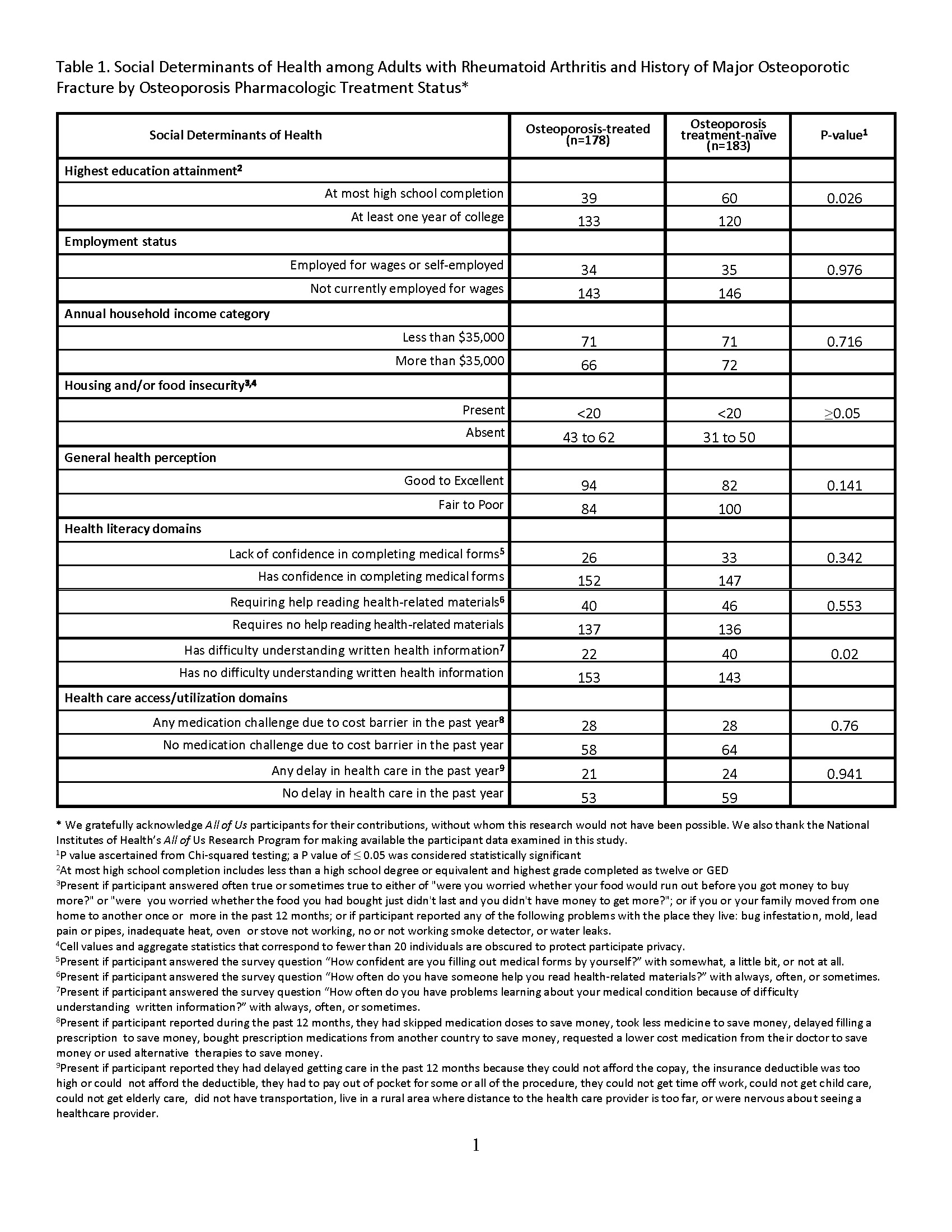Session Information
Session Type: Poster Session B
Session Time: 10:30AM-12:30PM
Background/Purpose: Despite widely available bone health pharmacologic therapies, there is a significant osteoporosis treatment gap in individuals with rheumatoid arthritis (RA). The aim of this study is to describe social determinants of health in individuals with RA and a history of major osteoporotic fracture (MOF), comparing those who are and are not prescribed some form of osteoporosis pharmacologic therapy.
Methods: We conducted a retrospective, cross-sectional study of adults age ≥ 18 years old in the U.S. National Institutes of Health All of Us Research Program, a national cohort with data repository consisting of patient survey and linked electronic health record (eHR) data. We utilized the All of Us Registered Tier Dataset version 7. We included participants with a diagnosis of RA (≥ 2 International Classification of Diseases (ICD)-9/10 diagnosis codes for RA at least 30 days apart) and a history of a MOF (a prior fracture at any of forearm, hip, humerus, or thoracic/lumbar spine; defined by any ICD-9/10 claim for a humerus or forearm fracture, an ICD-9/10 inpatient claim for a hip or vertebral fracture, or a Healthcare Common Procedure Coding System (HCPCS) or ICD-9/10 claim for a hip fracture repair procedure). We constructed two cohorts: osteoporosis-treated and osteoporosis treatment-naïve participants. Participants were classified as osteoporosis-treated if they received any prescription for a bone health pharmacologic therapy (oral or IV bisphosphonate, denosumab, raloxifene, abaloparatide, teriparatide, or romosozumab) at any time; otherwise, a participant was treatment-naïve. We described and compared social determinants of health characteristics between osteoporosis-treated and treatment-naïve participants using chi-squared testing. Social determinants of health examined included: educational attainment, employment, income, housing and/or food insecurity, general health perception, health literacy, and healthcare access and utilization.
Results: There were 361 participants with RA and a history of MOF included in this study; the majority were women (81%), White race (71%), and aged > 65 years old (71%). Of participants, 178 were osteoporosis-treated (49%) and 183 were osteoporosis treatment-naïve (51%). Lower educational attainment and self-reported difficulty understanding written health information were significantly associated with osteoporosis treatment-naïve status. The two other domains of health literacy examined (lack of confidence in completing medical forms and requiring help reading health-related materials) were not associated with osteoporosis treatment status (Table 1).
Conclusion: Our study suggests lower educational attainment and lower health literacy may be associated with a decreased likelihood of being prescribed pharmacologic treatment for osteoporosis among individuals with RA and a history of a major osteoporotic fracture. Healthcare providers should consider tailoring their patient education on osteoporosis and its pharmacologic treatments, especially written educational materials, to the appropriate educational and reading level of their patients, with the goal of improving equitable healthcare delivery.
To cite this abstract in AMA style:
Weber M, Basida B, Hoffer C, Elam R. Social Determinants of Health in Osteoporosis Treatment Patterns Among Adults with Rheumatoid Arthritis and Major Osteoporotic Fracture in the All of Us Research Program: A Cross-Sectional Study [abstract]. Arthritis Rheumatol. 2024; 76 (suppl 9). https://acrabstracts.org/abstract/social-determinants-of-health-in-osteoporosis-treatment-patterns-among-adults-with-rheumatoid-arthritis-and-major-osteoporotic-fracture-in-the-all-of-us-research-program-a-cross-sectional-study/. Accessed .« Back to ACR Convergence 2024
ACR Meeting Abstracts - https://acrabstracts.org/abstract/social-determinants-of-health-in-osteoporosis-treatment-patterns-among-adults-with-rheumatoid-arthritis-and-major-osteoporotic-fracture-in-the-all-of-us-research-program-a-cross-sectional-study/

